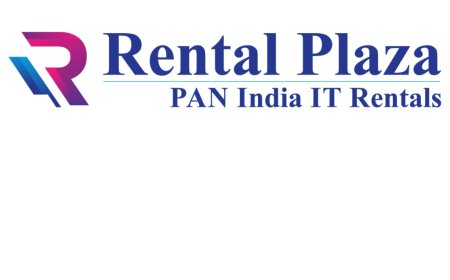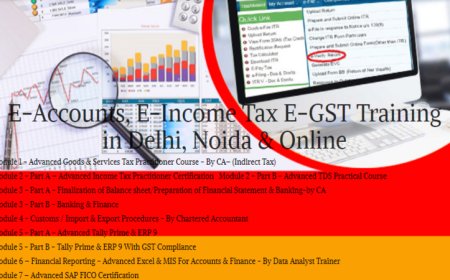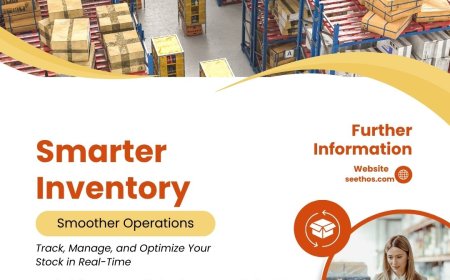How ERP Improves Financial Visibility for Saudi Enterprises
Learn how the process of financial performance forecasting is essential to the development of any company.

Financial visibility does not only involve knowing the amount of revenue received and spent. It entails a real time and clear picture of the financial performance of an organization, its obligations and predictions. In the case of Saudi businesses that need to be implemented in a fast-changing economic environment, especially in the context of Vision 2030 reforms, such degree of transparency is no longer a luxury but a necessity. The best erp system in saudi arabia are emerging as a key component in providing this kind of visibility which enables the business to trace, track, and interpret its financial data accurately.
Converging Financial Operations with a Single Solution:
The conventional financial management processes are usually disjointed systems or manual based processes that take time to access the critical information. ERP software is used to solve this problem because it combines different financial capabilities, including general ledger, accounts payable and receivable, budgeting, and tax management, in a single convenient system. This integrated platform enables finance departments of the Saudi businesses to remove duplication of data entries as well as ability to access the consolidated reports immediately. Once a transaction is made in a department, it appears in the whole system, thus making it more accurate and time conscious. Such real-time synchronization is very important to CFOs and decision-makers who need the latest information to make the right decisions.
Real-time Reporting: Empowerment of Decision-Making:
Dashboards and custom reports in the ERP systems provide raw data that can be converted to actionable intelligence. This aspect is priceless in the context of a Saudi enterprise as far as compliance and strategic planning are concerned. Flexibility in the generation of financial reports at any point in time, including cash flow statements, balance sheets, and so on implies that stakeholders are no longer limited to month-end reports. They are instead able to review performance on a day to day or weekly basis, see the trends and act in time. This constant availability of financial information adds to the agility of the company and it can easily change direction in case of regulatory changes, market volatility or investment opportunities.
Facilitation of ZATCA Compliance and Tax Reporting:
On the one hand, the digital transformation of Saudi Arabia, and especially such initiatives as the e-invoicing regulations of ZATCA, requires stringent financial control and correct documentation. The hr software in saudi arabia solutions also have features that support local compliance requirements such as automated VAT calculations, generating electronic invoices and managing audit trails. Optimization of financial operations in accordance with ZATCA standards will help Saudi enterprises to minimize the risk of penalties and make the process of tax reporting easier. All transactions are recorded and saved in the system in a secure manner, so that whenever an audit or regulatory request is made, there is a record that can be presented and verified.
Increasing the Accuracy of Budgeting and Forecasting:
The process of financial performance forecasting is essential to the development of any company, but a lot of them fail because of the inability to gather and unify the data and inputs. The ERP software allows eradicating this issue because it considers the historical data and current inputs to provide credible financial projections. This is particularly critical to Saudi companies that have to contend with changing economic conditions or changes in government policy and hence they need to plan under such changing economic conditions or with changes in government policy. The ERP system assists the budget managers to develop models that take into consideration different scenarios, market turns, expansion plans among others, allowing them a clearer view of their future financial results. Such predictive precision enables companies to invest or make strategic changes with a more certain position.
Allowing Greater Control in Expenditure and Resources:
The second important advantage that ERP systems can offer to Saudi businesses is a better management of the costs and resource distribution. The platform allows immense transparency on how money is being used, by whom and on what. This will assist in detecting inefficiencies, prevent duplication of expenses, and also implement financial policies in a better manner. Within the ERP, departments can establish approval levels and spending limits and therefore reduce unauthorized or excessive expenditure. With time, this control will result in improved financial prudence and healthy balance sheets which in the long run will enhance the sustainability of the business.
Conclusion:
Good governance and sustainable growth is based on financial visibility. In the case of Saudi enterprises, implementing an ERP system does not only imply that the work will be done with the help of automation, but it serves as a strategic tool that enables leaders to have the entire picture on their sight, act promptly, and strategically plan. In a world where the business environment is slowly transitioning towards dynamism and digitization, ERP software has emerged as the perfect companion in the quest to realize financial clarity, regulatory compliance, and competitive edge.
























































